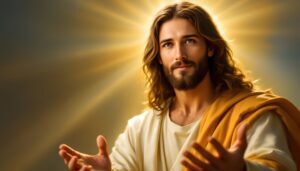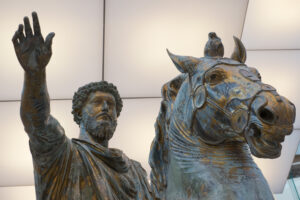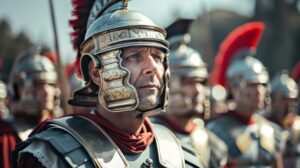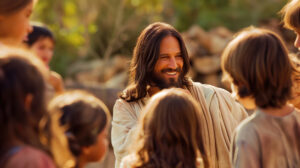Whose Christianity? (#3)
O come, O come, Emmanuel,
And ransom captive Israel,
That mourns in lonely exile here,
Until the Son of God appear.
Rejoice! Rejoice! Emmanuel
Shall come to thee, O Israel.
O come, Thou Rod of Jesse, free
Thine own from Satan’s tyranny;
From depths of hell Thy people save,
And give them victory o’er the grave.
Rejoice! Rejoice! Emmanuel
Shall come to thee, O Israel.
– John Mason Neale (1818-1866), Translator from the Latin, from “O Come, O Come Emmanuel” (12th Cen)
 When the long-promised Messiah so deeply yearned for in our frame-verse this week came to us at last, He brought to all of humankind the Godhead’s ultimate gifts. The Son of God was born on earth to bring us knowledge of the easiest way to make this our last necessary earth-lifetime of having to learn hard-won spiritual lessons. That was the freedom from “Satan’s tyranny” mentioned in our frame-verse. It is what Buddhists call freedom from “turning on the wheel,” that need to keep returning to earth with little added knowledge gained each time. And Jesus also brought us the explosive truth that our lives truly are eternal! As our frame-verse tells us, He brought us “victory o’er the grave”. Our lives never are going to end, so it will indeed be worthwhile for us to make the effort to learn our spiritual lessons while we are on earth, since we will profit forevermore from our having learned them. And the prize of all this glorious wisdom, these very great eternal gifts, Jesus called “the Way.” Jesus’s Way spread rapidly during the first few centuries following His death and resurrection. It reached many millions of people, more than halfway around the Mediterranean Sea and as far away as Rome, until the Roman Emperor Constantine came along.
When the long-promised Messiah so deeply yearned for in our frame-verse this week came to us at last, He brought to all of humankind the Godhead’s ultimate gifts. The Son of God was born on earth to bring us knowledge of the easiest way to make this our last necessary earth-lifetime of having to learn hard-won spiritual lessons. That was the freedom from “Satan’s tyranny” mentioned in our frame-verse. It is what Buddhists call freedom from “turning on the wheel,” that need to keep returning to earth with little added knowledge gained each time. And Jesus also brought us the explosive truth that our lives truly are eternal! As our frame-verse tells us, He brought us “victory o’er the grave”. Our lives never are going to end, so it will indeed be worthwhile for us to make the effort to learn our spiritual lessons while we are on earth, since we will profit forevermore from our having learned them. And the prize of all this glorious wisdom, these very great eternal gifts, Jesus called “the Way.” Jesus’s Way spread rapidly during the first few centuries following His death and resurrection. It reached many millions of people, more than halfway around the Mediterranean Sea and as far away as Rome, until the Roman Emperor Constantine came along.
Thomas and I experienced together Constantine’s destruction of Jesus’s Way. In fact, becoming caught up in its destruction was actually how we first met. There is no way I would remember any of that now, seventeen additional shared lifetimes and two millennia later, but Thomas used his recalling dramatically back to my mind of the morning long ago when we first met as one way to first break the modern ice between us. It turns out that there are some who see Constantine’s bloody destruction of the Way of Jesus at least somewhat romantically.
 One of my favorite fellow-laborers in this field of spreading the teachings and the love of Jesus is Father Richard Rohr. Father Richard is a Franciscan Friar who is the founder and head of the Center for Action and Contemplation in Albuquerque, New Mexico. He and his people do admirable work, and he is especially in love with the desert mystics, the very first of whom were those few who survived Constantine’s massacres of all the early followers of Jesus who did not accept Constantine’s singular view of Christianity, which was that Jesus had died for our sins. As you may recall from our last week’s missive, the Roman Emperor Constantine believed that he had received a divine message that told him he would conquer by the sign of Jesus’s cross. So, while the notion that Jesus had died for our sins had been just one minor idea in the multifaceted Way of Jesus, Constantine then set out to take over The Way, and to murder every follower of Jesus who held any other idea about what Jesus ever had taught. And, as Father Richard notes, a few of the disfavored followers of Jesus who still held to any of His other teachings managed to flee into the desert wilderness quickly enough to escape being massacred by Constantine’s legions. The following passage is taken from the good friar’s daily letter of April 6, 2025:
One of my favorite fellow-laborers in this field of spreading the teachings and the love of Jesus is Father Richard Rohr. Father Richard is a Franciscan Friar who is the founder and head of the Center for Action and Contemplation in Albuquerque, New Mexico. He and his people do admirable work, and he is especially in love with the desert mystics, the very first of whom were those few who survived Constantine’s massacres of all the early followers of Jesus who did not accept Constantine’s singular view of Christianity, which was that Jesus had died for our sins. As you may recall from our last week’s missive, the Roman Emperor Constantine believed that he had received a divine message that told him he would conquer by the sign of Jesus’s cross. So, while the notion that Jesus had died for our sins had been just one minor idea in the multifaceted Way of Jesus, Constantine then set out to take over The Way, and to murder every follower of Jesus who held any other idea about what Jesus ever had taught. And, as Father Richard notes, a few of the disfavored followers of Jesus who still held to any of His other teachings managed to flee into the desert wilderness quickly enough to escape being massacred by Constantine’s legions. The following passage is taken from the good friar’s daily letter of April 6, 2025:
“After the legitimization and, some would say, the co-opting of Christianity by the Roman Empire in the 4th century, many Christians fled to the deserts of Egypt, Palestine, Syria, and Cappadocia (Eastern Turkey). We call these men and women the desert fathers and mothers (or abbas and ammas). The desert Christians emphasized lifestyle practice, an alternative to empires and their economies, psychologically astute methods of prayer, and a very simple spirituality of transformation into Christ. The desert communities grew out of informal gatherings of monastics and functioned much like families. This tradition preceded the emergence of systematic theology and the later Church councils. Since the desert monks often lacked formal education, they told stories, much as Jesus did, to teach about ego, love, virtue, surrender, peace, divine union, and inner freedom.”
Well, yes, dear Father Richard, my Thomas and I would certainly call that 4th century Roman takeover of Jesus’s Way by Constantine a bloody co-opting of Christianity by the Roman Empire!
 Here is what happened to me one morning in the summer of 2015, so it was almost ten years ago now. I was sitting alone at our kitchen table with a cup of tea one early morning, watching through our wall-sized kitchen window as the slanted sunlight rising through the trees from the right took over our grassy back yard. But of course, I was not alone. Thomas, my spirit guide, had first come out to me that previous February, and I was then only barely becoming used to hearing his occasional murmured voice, which back then usually came from behind my left shoulder. Nowadays, Thomas nearly always talks and is dimly visible from in front and to my right.
Here is what happened to me one morning in the summer of 2015, so it was almost ten years ago now. I was sitting alone at our kitchen table with a cup of tea one early morning, watching through our wall-sized kitchen window as the slanted sunlight rising through the trees from the right took over our grassy back yard. But of course, I was not alone. Thomas, my spirit guide, had first come out to me that previous February, and I was then only barely becoming used to hearing his occasional murmured voice, which back then usually came from behind my left shoulder. Nowadays, Thomas nearly always talks and is dimly visible from in front and to my right.
Unexpectedly my Thomas said, sounding warm and dreamy, almost romantic, “What does this remind you of?”
I still would be startled by his voice whenever he would suddenly speak, right there so close. I said in my mind, “What? Nothing. What should it remind me of?”
“The morning when we died together. That was how we met.”
“Died? What are you talking about? Tell me.”
 So he told me. And as he told this story in my mind, and he answered my questions over the course of that summer morning, I gradually began to resurrect some very ancient memories. I was a young boy, ten or twelve years old, and precious to my parents, who had desperately hidden me in our hovel before they went out bravely with the rest of the grown-ups to defend our village against the approaching Roman legion. Our people had nothing to fight with, only farm implements for weapons. Thomas tells me this happened in the south of what is now Syria. I can dimly remember hearing lots of shouting, screaming, the clash of metal, and I had to see what was going on, but as soon as I barely opened the door, a legionnaire ran me through with his sword and I fell.
So he told me. And as he told this story in my mind, and he answered my questions over the course of that summer morning, I gradually began to resurrect some very ancient memories. I was a young boy, ten or twelve years old, and precious to my parents, who had desperately hidden me in our hovel before they went out bravely with the rest of the grown-ups to defend our village against the approaching Roman legion. Our people had nothing to fight with, only farm implements for weapons. Thomas tells me this happened in the south of what is now Syria. I can dimly remember hearing lots of shouting, screaming, the clash of metal, and I had to see what was going on, but as soon as I barely opened the door, a legionnaire ran me through with his sword and I fell.
The next thing I remember is this big, gruff man with a grizzled head of hair and beard lifting me in his arms to give me sips of water. He also was bleeding. All around us were the bodies of the villagers, and my parents were among them. The man, who I think had been the village chieftain, told me that he had played dead and survived, although he was mortally wounded. There were a couple of others that he also was tending, but once they had died, he came back and laid down and held me in his arms until I died. Later that morning, he died as well.
 It surprised me that just hearing Thomas describe these events could so well trigger memories from a lifetime that was so long past. Yet, so it was! He even resurrected the vivid sounds, and the smell of death on that ancient morning. Once Thomas also had died, he rose to me where I hung confused above him in the air, and he took me home to the healing gardens in the afterlife. My memory of that experience is vaguer, but Thomas wanted me to remember when I first met Jesus as He lovingly tended the victims of that massacre. All I can recall now is how this nice big hulk of a man that I thought of as a comforting grandfather took me to meet a young man who was tending lots of traumatized people on pallets. He had a zingy energy about Him that I found alarming, and he vaguely glowed with light, which was also alarming. He glanced up, saw the grandfather, and mentally said something like, “Great! You’re back. Lots to do here.” And He was right back to comforting the damaged ones who were writhing on pallets around him. As a newly-transitioned child still in shock who had just lost both his parents, I don’t think I realized who Jesus was.
It surprised me that just hearing Thomas describe these events could so well trigger memories from a lifetime that was so long past. Yet, so it was! He even resurrected the vivid sounds, and the smell of death on that ancient morning. Once Thomas also had died, he rose to me where I hung confused above him in the air, and he took me home to the healing gardens in the afterlife. My memory of that experience is vaguer, but Thomas wanted me to remember when I first met Jesus as He lovingly tended the victims of that massacre. All I can recall now is how this nice big hulk of a man that I thought of as a comforting grandfather took me to meet a young man who was tending lots of traumatized people on pallets. He had a zingy energy about Him that I found alarming, and he vaguely glowed with light, which was also alarming. He glanced up, saw the grandfather, and mentally said something like, “Great! You’re back. Lots to do here.” And He was right back to comforting the damaged ones who were writhing on pallets around him. As a newly-transitioned child still in shock who had just lost both his parents, I don’t think I realized who Jesus was.
 Thomas tells me that these events occurred barely three hundred years after Jesus’s crucifixion and resurrection. And of course, this was just the beginning for Jesus of His spiritual healing work, at which He toiled almost without respite until nearly the start of the twentieth century. It has been estimated that over all those intervening centuries, at least ten million lives would be destroyed on earth by the Christian religion in all its Inquisitions, Crusades and wars. That whole history is especially well recounted in Helen Ellerbe’s The Dark Side of Christian History. And for all those many centuries, Jesus faithfully labored in his healing gardens in the afterlife, loving and comforting and healing all those millions of victims traumatized by the Christian religion back into emotional and spiritual health.
Thomas tells me that these events occurred barely three hundred years after Jesus’s crucifixion and resurrection. And of course, this was just the beginning for Jesus of His spiritual healing work, at which He toiled almost without respite until nearly the start of the twentieth century. It has been estimated that over all those intervening centuries, at least ten million lives would be destroyed on earth by the Christian religion in all its Inquisitions, Crusades and wars. That whole history is especially well recounted in Helen Ellerbe’s The Dark Side of Christian History. And for all those many centuries, Jesus faithfully labored in his healing gardens in the afterlife, loving and comforting and healing all those millions of victims traumatized by the Christian religion back into emotional and spiritual health.
 What is most remarkable to me is that in all those centuries, Thomas tells me that Jesus never has expressed the slightest bit of negativity or resentment toward the Christian religion, or toward the Roman Emperor Constantine himself. Not even once! And my Thomas would know. As I have come to understand just in recent years, my spirit guide is, surprisingly, a very close personal friend of Jesus’s, even a bestie if you will, from before Jesus became a perfected being; and they still spend a great deal of time together. Thomas tells me that the service that he performs for Jesus is an astonishing, but an essential one. Jesus became an aspect of the Godhead something like six thousand years ago. Then He spent most of the past two thousand years loving millions of people back into emotional and spiritual health. By now, He is vibrating even higher than the Godhead of this universe, which is something almost impossible for us to imagine. When you visit Jesus – and you will, when you transition – He will have to tone His personal energy down by a lot in order for you even to get close to Him.
What is most remarkable to me is that in all those centuries, Thomas tells me that Jesus never has expressed the slightest bit of negativity or resentment toward the Christian religion, or toward the Roman Emperor Constantine himself. Not even once! And my Thomas would know. As I have come to understand just in recent years, my spirit guide is, surprisingly, a very close personal friend of Jesus’s, even a bestie if you will, from before Jesus became a perfected being; and they still spend a great deal of time together. Thomas tells me that the service that he performs for Jesus is an astonishing, but an essential one. Jesus became an aspect of the Godhead something like six thousand years ago. Then He spent most of the past two thousand years loving millions of people back into emotional and spiritual health. By now, He is vibrating even higher than the Godhead of this universe, which is something almost impossible for us to imagine. When you visit Jesus – and you will, when you transition – He will have to tone His personal energy down by a lot in order for you even to get close to Him.
So Thomas tells me that what Jesus needs and craves now more than anything else is what they both refer to as “balance.” Jesus is, as the saying goes, indeed “fully God and fully Man”; but at this point, He is too much toward the divine. What He needs is a way to maintain a solid remnant of His human nature as well, when He is vibrating at the Godhead level and everyone sees Him as a purely divine Being. Everyone, that is, except for my Thomas, who was Jesus’s older brother in their last shared earth-lifetime prior to Jesus’s first ascension, and who has been close to Him now for more than six thousand years. I got to see when I was allowed to remember some visits with Thomas that I made to Jesus during the summer of 2022 how Thomas helps Jesus to maintain His human balance. I swear that, so help me, this is true!
 Jesus is spending His eternity on a riverbank on lowly level three of the astral because that level is accessible to nearly every newcomer to the afterlife. Jesus wants to greet everyone who has just transitioned and wants to meet Him, so these people are brought to Him in groups every half-hour or so. But meanwhile, sometimes I got to watch Jesus and Thomas just sitting on that riverbank, feeding the fish perhaps, and chatting softly in what Thomas tells me is the language of their last shared lifetime, so it is a language now dead for six thousand years and they must be the only ones who still speak it. Thomas tells me that they enjoy keeping it alive. Then Jesus might start to stand as He jabs an insult at Thomas, generally a word which my spirit guide tells me translates to something like “bloody general”, and was one of his honorifics in that ancient lifetime. Jesus takes off running, Thomas mutters “Brat!” in their language and chases and catches Him, and they tussle like teenagers on the ground. They really fight! Astral bodies are indestructible. They cannot even feel pain. But Thomas is bigger and stronger so he always wins these little battles. And he is, as he tells me Jesus is fond of telling him, still Jesus’s big brother. Thomas thinks Jesus finds a kind of human grounding in the thought of having a brother who “outranks” him and can beat him up.
Jesus is spending His eternity on a riverbank on lowly level three of the astral because that level is accessible to nearly every newcomer to the afterlife. Jesus wants to greet everyone who has just transitioned and wants to meet Him, so these people are brought to Him in groups every half-hour or so. But meanwhile, sometimes I got to watch Jesus and Thomas just sitting on that riverbank, feeding the fish perhaps, and chatting softly in what Thomas tells me is the language of their last shared lifetime, so it is a language now dead for six thousand years and they must be the only ones who still speak it. Thomas tells me that they enjoy keeping it alive. Then Jesus might start to stand as He jabs an insult at Thomas, generally a word which my spirit guide tells me translates to something like “bloody general”, and was one of his honorifics in that ancient lifetime. Jesus takes off running, Thomas mutters “Brat!” in their language and chases and catches Him, and they tussle like teenagers on the ground. They really fight! Astral bodies are indestructible. They cannot even feel pain. But Thomas is bigger and stronger so he always wins these little battles. And he is, as he tells me Jesus is fond of telling him, still Jesus’s big brother. Thomas thinks Jesus finds a kind of human grounding in the thought of having a brother who “outranks” him and can beat him up.
 But as charming and comforting as I find the brothers’ intense friendship, and despite all the patience and grace with which Jesus has forgiven Constantine’s butchery of Jesus’s long-prophesied earthly mission, the way that the Emperor Constantine hijacked Jesus’s Way long ago still very much troubles me. Jesus came to teach us how to achieve liberation from endless incarnations through forgiveness and love, and He added the glorious bonus lesson that human life is joyously eternal! Then Constantine stole all of that from us, and he distorted Jesus’s entire long-prophesied mission for that Roman general’s own war-based purposes. Emmanuel came at last! But Constantine conquered all the good that He did. And the botch of a religion that Constantine made instead of The Way has by now split into more than forty-five thousand variations. In most Christian churches today, sin-laden plaster Jesuses bleed and die on crosses forevermore, and a symbolic Seder becomes actual flesh and blood, while God’s precious gift of Messianic teachings that were the whole point of Jesus’s having been born on earth are hardly mentioned. So now we wonder, as we look toward holding yet another vigil at the foot of the cross, and then rolling aside the stone on another Easter morning. Will this year at last be any different…?
But as charming and comforting as I find the brothers’ intense friendship, and despite all the patience and grace with which Jesus has forgiven Constantine’s butchery of Jesus’s long-prophesied earthly mission, the way that the Emperor Constantine hijacked Jesus’s Way long ago still very much troubles me. Jesus came to teach us how to achieve liberation from endless incarnations through forgiveness and love, and He added the glorious bonus lesson that human life is joyously eternal! Then Constantine stole all of that from us, and he distorted Jesus’s entire long-prophesied mission for that Roman general’s own war-based purposes. Emmanuel came at last! But Constantine conquered all the good that He did. And the botch of a religion that Constantine made instead of The Way has by now split into more than forty-five thousand variations. In most Christian churches today, sin-laden plaster Jesuses bleed and die on crosses forevermore, and a symbolic Seder becomes actual flesh and blood, while God’s precious gift of Messianic teachings that were the whole point of Jesus’s having been born on earth are hardly mentioned. So now we wonder, as we look toward holding yet another vigil at the foot of the cross, and then rolling aside the stone on another Easter morning. Will this year at last be any different…?
O come, Thou Dayspring, from on high,
And cheer us by Thy drawing nigh;
Disperse the gloomy clouds of night,
And death’s dark shadows put to flight.
Rejoice! Rejoice! Emmanuel
Shall come to thee, O Israel.
O come, Thou Key of David, come
And open wide our heavenly home;
Make safe the way that leads on high,
And close the path to misery.
Rejoice! Rejoice! Emmanuel
Shall come to thee, O Israel.
O come, Adonai, Lord of might,
Who to Thy tribes, on Sinai’s height,
In ancient times didst give the law
In cloud and majesty and awe.
Rejoice! Rejoice! Emmanuel
Shall come to thee, O Israel.
– John Mason Neale (1818-1866), Translator from the Latin, from “O Come, O Come Emmanuel” (12th Cen)
(Many photos are from Vecteezy.com)
The post Whose Christianity? (#3) appeared first on Roberta Grimes.



